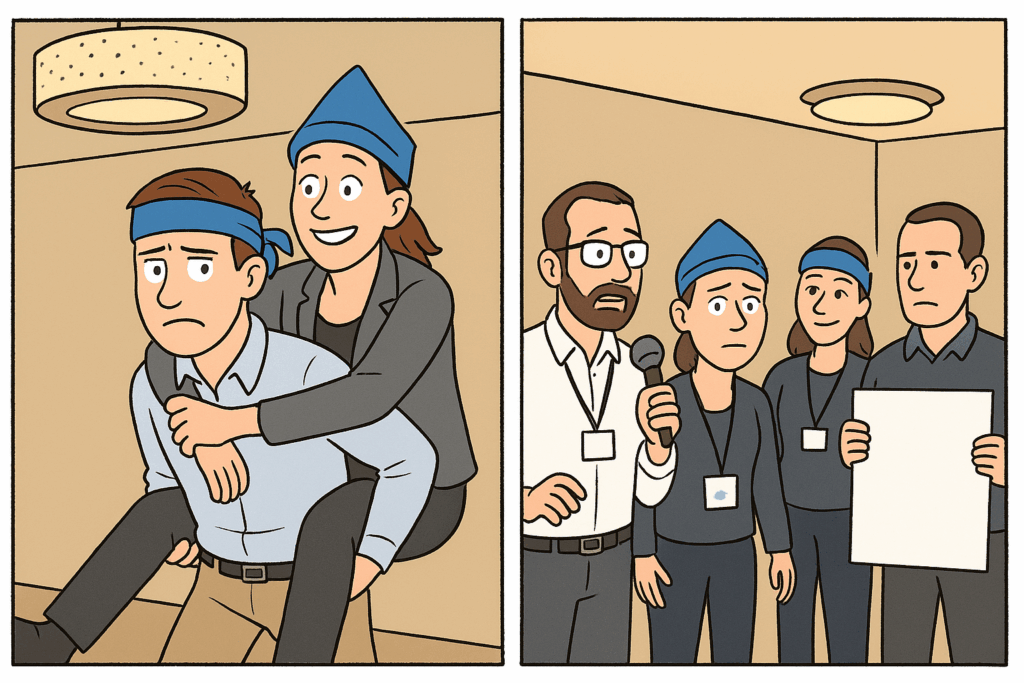Probably around the time you spend more energy pretending to be excited than actually doing your job. When clapping on demand drains your soul, and your daily inner monologue shifts from “This is fine” to “Who even am I anymore?”
I spent close to 15 years in corporate life and, truth be told, I don’t regret a single year. It helped set my family up financially, flew me around the world – hello Las Vegas, San Francisco, and Los Angeles – and exposed me to people, projects, and situations that were both character-building and occasionally sanity-testing. I met colleagues who turned into lifelong friends. For that, I feel real gratitude.
But somewhere in my mid-30s, something began to itch. Not a faint whisper but more like a persistent mosquito trapped in my brain. The itch turned into a rash the moment I was handed a bandana and instructed to “cheer enthusiastically” for a corporate cause I didn’t actually believe in. That picture above is modelled after a very real picture of a team-building moment in Silicon Valley where my creative soul politely checked out of the building. Each forced clap felt like another tiny betrayal of my authenticity – not to mention the pressure to wear a bandana.
You’re Not Broken — You’re Evolving
According to Lynda Gratton, co-author of The 100-Year Life, we’re still clinging to an outdated model of living: education → work → retirement. One straight line. One identity. One career.
But as people live longer and healthier lives, Gratton argues that this old “three-stage life” is becoming obsolete. Instead, life is best lived in multiple stages: phases of learning, working, pausing, reinventing – sometimes several times over.
In other words:
Outgrowing your corporate identity isn’t a crisis. It’s biology.
Yet most of us treat it like a personal malfunction.
Rather than acknowledging growth, we judge ourselves. Shouldn’t I be grateful? Shouldn’t I want to climb higher? Isn’t that next promotion where happiness lives?
Leaving Corporate Isn’t About Recklessness — It’s About Strategy
Let’s be practical: you don’t just dramatically throw your badge on your manager’s desk and walk into the sunset. (Well, you can, but your mortgage might have a different opinion. Mine certainly did!)
Exiting corporate life usually requires:
- A vision beyond “anything but this”
- A financial runway
- Skills, ideally transferable or buildable
- A supportive partner or community (optional, but highly recommended for sanity)
- And finally: courage, patience, and a healthy relationship with uncertainty
When my own inner exit alarm went off, I didn’t quit overnight. I secretly enrolled in a coaching programme. I started learning, experimenting, building; between meetings, after bedtime stories, during stolen pockets of silence. With two kids under six, it was more slow burn than Hollywood leap. But it was movement. And movement is everything. It gives you back your self-respect.
Signs You’re Ready (or Getting Close)
- You spend more time performing enthusiasm than feeling it.
- Cynicism has become your default setting.
- You feel underused, undervalued, or simply underwhelmed.
- You’re fantasising about anything else – not out of desperation, but curiosity.
If things are actively harming your mental or physical health, don’t wait. Seek help. Plan your exit sooner rather than later.
But if your situation is more “meh” than miserable, start building your bridge before you leap. Begin learning, testing, second-skilling. Don’t wait for permission — outgrowing a role isn’t betrayal. It’s evolution.
Leaving corporate isn’t about rejecting your past. It’s about graduating from it.
The question isn’t “Why leave?”
It’s “What’s the next stage of your life asking of you?”



